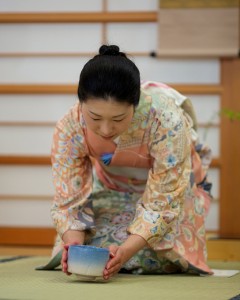Way of Tea

CHA-NO-YU (literally, hot water for tea), or SA-DÔ (also CHA-DÔ, the Way of Tea), is one of the most highly refined traditional arts of Japan. It has been an important influence on Japanese architecture, landscape gardening, ceramics, and floral arts. Chanoyu has also shaped many of the artistic values and social etiquette observed by the Japanese people. Tea as a beverage and medicine was introduced to Japan from China in the early 700’s by Buddhist monks. Sen no Rikyu (1522-1591) was a Zen lay priest who perfected the tea ceremony as it is known today.
The main point in Chanoyu is not the drinking aspect of tea but rather the appreciation of beauty, simplicity, and spiritual tranquility that form the essential principles of Zen. In our more complex and affluent age, Chanoyu has had increasing appeal for men and women worldwide. For the guest, it involves appreciation of the tea room, the utensils used in serving the tea, the scroll or simple flower arrangement in the room, the skill and grace of the host, and above all, the effort the host has made to have his guests spend a moment in time enjoying this unique experience. The host must prepare the tea to the best of her/his ability, for Chanoyu is meant to be a harmonious and tranquil expression of friendship.
The Chanoyu demonstrations are under the auspices of the San Francisco and Northern California chapters of the Urasenke and Omotesenke Schools. The Omotesenke Domonkai, Urasenke Foundation, and Chado Urasenke Tankokai will each present a Tea Ceremony in the Tateuchi Auditorium within the Nihonmachi Little Friends (NLF) building at 1830 Sutter Street. Each session will be about 30 minutes in length, and tea sweets and Matcha tea will be served to seated members of the audience. We encourage you to join a session to learn more about the art of Chanoyu!
Â
Omotesenke Chado Tradition
Omotesenke is a school founded by Sen no Rikyu, and the name is translated to “front Sen house.” The Omotesenke Chanoyu tradition has over 400 years of history at the Fushin’an tea room in Kyoto. Fushin’an is named after the Zen saying, “Fushin hana hiraku konnichi no haru,” meaning, “Mysteriously the flowers open. Spring today.” Chanoyu is interpreted as “a communication of the minds of host and guests through the enjoyment of delicious tea together,” and considered a living culture and daily tea practice passed down from generation to generation of Iemotos or grand masters.
The Northern California Region of Omotesenke Domonkai was founded in 1970, where Omotesenke Tea parishioners in the Bay Area were invited to drink tea and work together to further their understanding of the Way of Tea.
Urasenke Chado Tradition
Urasenke is another school founded by Sen no Rikyu, and the name means “rear Sen house.” Dating back from the early 17th century, Urasenke Konnichian of Kyoto has preserved and furthered the rich cultural tradition of Chanoyu. With the hope of fostering international goodwill through cultural education, Sen Genshitsu Hounsai zen iemoto, head tea master of the Urasenke Tradition of Chanoyu, had traveled extensively to introduce Chanoyu outside of Japan since his first visit to the U.S. in 1951.
Since its establishment by Sen Genshitsu Hounsai zen iemoto in 1981, the Urasenke Foundation, San Francisco Center has provided public service educational programs on Chanoyu and Japanese culture under the direction of Christy A. Bartlett. The Foundation offers the general public an opportunity to learn more about Chanoyu and Japanese culture through direct participation in tea gatherings, lectures, workshops and other events, serve as a resource center for local and visiting scholars and artists, and to offer instructions in Chanoyu.
The San Francisco Urasenke Seinenkai (Young Adult Association) was created in 1995 to provide Bay Area Chanoyu students opportunities for camaraderie and the enjoyment of the culture of tea.
The Chado Urasenke Tankokai San Francisco Association’s mission is to engage in research concerning Urasenke Chado culture, introduce Chado to the local and global community, and contribute to inter-cultural exchange and world peace. At a future in-person Festival, the Chado Urasenke Tankokai will conduct a Chanoyu presentation in the Tateuchi Auditorium within the Nihonmachi Little Friends building.
Hokka Nichi Bei Kai recently renovated Kanso-an, the first authentic Japanese Tea Room or Chashitsu in the U.S. This tea room was carefully designed by Professor Masao Nakamura, a leading authority on traditional Japanese architecture and interior design, as well as a construction consultant to the Japanese Imperial Family. Construction of the tea room was completed by Kyoto-based Yasuimoku Komuten, a firm known for their restoration of the Katsura Imperial Villa, then brought over in travel-friendly pieces, and assembled on site by craftsmen.
The Nichi Bei Kai Tea Society (Omotesenke and Urasenke Schools) will host ticketed Tea Ceremony sessions in the Hokka Nichi Bei Kai building at 1759 Sutter Street. Do not miss this opportunity to gain the full experience of the Japanese Tea Room, conveniently located in San Francisco’s Japantown!
